 Special for
New Bay Times' 'Trees for the Bay' Birthday Bash
Special for
New Bay Times' 'Trees for the Bay' Birthday Bash
 Special for
New Bay Times' 'Trees for the Bay' Birthday Bash
Special for
New Bay Times' 'Trees for the Bay' Birthday Bash
What Does a Tree Look Like?
A Fantasy for All Ages
story by Carolyn Stearns, author of
Where Has All the Water Gone?
illustrations by Betsy Kehne
My name is Emily. I'm 11 years old. I visit with my Great Granny a lot when my family and I come up to the old family homestead in Deale, Maryland, at the lower point of Mason's Beach on the west side of Chesapeake Bay. My family has owned this house for years.
I love it because the house is big enough for my whole family to gather together. It's the only place I get to see my cousins. My cousins and I think the house we share is a castle because of the way it shines when the sun is on it. Our house is made of old pop bottles.
My Great Granny is over a hundred years old. I'm the only one in the family she likes to talk to, or so she says. She and I usually meet in my bedroom, when I'm by myself. I'm always asking questions.
Great Granny has a very strange way of floating about the room. I never see her knit or sew or read.
"Great Granny, what does a tree look like?" I ask one rainy evening while I'm playing with the Legos Mom says are as old as the house. "I need a picture of a tree so I can make copies of it for the town I'm making."
"Remember the little squiggly thing on the cover of your Brownie manual?"
"Yes."
"That's a tree."
"No. It's a twig. I want to know what a tree looks like."
My Great Granny thinks a moment and then says, "A tree looks like a twig, only older and bigger."
The Age of Wood
"My grandfather said his father told him trees used to be so big around it took a group of people to hug a tree. He also said trees were so tall they were used to make masts on the tall sailing ships. That gives you an idea of how tall and how big around trees used to be. Now very few trees exist, certainly none of the big ones, even here on Chesapeake Bay."
"What happened to them, Great Granny?"
"The truly big trees were gradually cut down, one by one, to make houses - people used to live in wooden houses, you know. They also used wood to make paper for newspapers and paper towels, napkins, pencils - all kinds of things. In fact, children used to have toys made out of wood, but not any more."
"I never had a wooden toy. I've never been in a wooden house."
"Well, a few are left standing. The best place to see a wooden house is at the Smithsonian Institution in Washington, D.C. They have one in their entry way. It's beautifully preserved."
"Will you take me there sometime? I'd love to see it."
"Of course I will. Would you like me to make some trees for your town?" she asks.
"I would."
"You get your rainy day box. Everything I need to make trees should be in there."
City of Trees
I get up from the table and reach up for my gas mask that is hanging on the wall and put it on. It's a family rule, even at the Chesapeake Bay where the air is supposed to be clearer, that if you step out of your airtight bedroom, you have to wear a gas mask.
"I'll only be a minute," I say.
I hurry to my sister's room where the rainy day box is stored. My sister is already asleep.
I pick up the box as quietly as I can, put it under my arm and hurry back to my room. Great Granny is at the table, moving my Legos from one place to another. She looks up at me as I close the door.
"Did you know," she asks, "that Washington, D.C., used to be called the City of Trees?"
"Really," I say as I yank off my gas mask and toss it onto
the bed.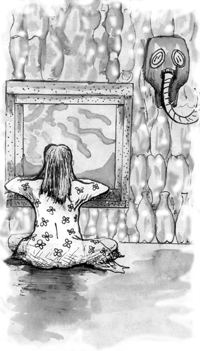
"All the streets in Washington used to be lined with the most beautiful trees. I've seen pictures of the city before the great elm disease killed most of the elm trees."
"Then that's what my Lego town will be," I declare, "a City of Trees." I hand Great Granny the rainy day box and sit down beside her. I pour out another coffee can filled with Lego pieces.
"Whatever happened to all those trees?" I ask. "I don't remember seeing any when I went to Washington on my class trip."
"They fell down in storms or got sick and died. No one ever bothered to replace them. Well, a few people tried. Your grandfather Jed, who was married to your grandmother Emily, for whom you were named, was one of them. But young trees need to be watered."
"Do you suppose a tree could grow here on Mason's Beach?" I jump out of my chair and go over to the window. "Everything is so barren."
"It's too late," Great Granny says. "The acid rain has left its mark. The trees put up a noble fight, but this little scruffy stuff is the only thing growing here now."
"Even if I water it every day?"
"Even if you water it every day."
"I saw a picture of a redwood once," I say as I rejoin my Great Granny at the table. "That was one big tree, wasn't it?"
"Yes, dear, it was." Great Granny opens the rainy day box and begins taking out scissors and green plastic and little Styrofoam blocks.
"I would love to see and touch a tree as big as that," I say.
"So would I," nods my Great Granny.
"Does the Smithsonian Institution have a redwood tree?"
"Goodness, no! There are no redwoods anywhere."
"What happened to them?"
"People cut them down, too, mainly to make furniture or to send to countries, such as Japan, who had very few trees. Then, when the waters came, what was left of the redwoods disappeared into the ocean. You've heard of the night the waters came?"
"A little at school. No one likes to talk about it much."
"What do you think of this?" asks Great Granny, holding up her first completed tree.
"Oh," I exclaim, "it's beautiful!" I take the tree from her hand. Great Granny immediately starts making another one.
The Night the Waters Came
"Well, before that dreadful night, people such as my parents, who loved antique furniture, used to sit in wooden chairs and sleep in wooden beds."
"I saw some wooden furniture," I say gleefully, "in a museum once, and I thought it was very beautiful. Kind of strange looking, though!"
"Wooden furniture was the most comfortable furniture ever made. This plastic chair hurts my back."
"I know what you mean."
"If you turn on the computer and bring up the photo album, you'll
see your grandfather sitting at one of the last redwood picnic tables, with
your grandmother sitting in one of the last wooden rocking chairs, holding
baby me in her arms."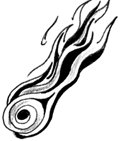
"What happened to that chair, that picnic table?"
"We burned them to keep warm during the three years of darkness, the three years that followed the night the waters came."
"That must have been so scary," I say. "What made the waters come?"
"Earth was struck by a huge meteorite, which made the planet shift off its axis."
"Is that why the Chesapeake Bay region is now as warm as Florida used to be?"
"Right. The meteorite caused an explosion, creating a tidal wave that was as high as the sky, and all the ash from the explosion darkened the sun. Those were three very cold years - the longest years of my life. The Big Boom happened in the summer when it was my family's turn to be up here."
"Is that when you burned the picnic table and the chair?"
"Yes. When the furniture was gone, we burned this house, board by board, shingle by shingle, until finally we were living in one room. Many people more inland became sick and died."
"Did the years of darkness kill the fruit trees?"
"Yes, the few that remained."
"How did you survive?"
"My mother wouldn't let me and my brothers and sisters sleep for more than 45 minutes out of every hour. She made all of us get up and jump around so we wouldn't freeze to death in our sleep. As you know, it can get very cold on Mason's Beach. Colder still when the sun couldn't be seen or felt."
"What did you eat?"
"Worms and mushrooms."
"Eeee-u!"
"Those who refused to eat mushrooms and worms didn't survive."
"Is that why we don't have worms here any more?"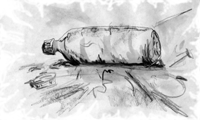
"That's right, and believe me, the soil is suffering because of it. The soil I remember used to be brown."
"When was this house rebuilt?"
"When the sun reappeared. Then we did what everyone else did. We went to the dump and built this house out of all the stuff we had thrown away. Your great grand-dad liked the idea of building a house out of glass soda bottles. The people on the other side of the fence built their house out of rubber tires. Since the seasons have changed so, it's nice we no longer have to worry about staying warm. I never want to be cold again."
"I can imagine," I whisper.
Beginning of the End
"It's almost your bedtime," says Great Granny. "And, you now have one, two, three, four, five, goodness, 10 trees for your City of Trees."
"Thank you for making them for me," I say. "Next summer, Mom and Dad are going to take me out West so I can see the Pacific Ocean. They say that along the Colorado coast, we can see oak trees in a zoo. I can't wait to see them."
"You must give the oaks a hug for me."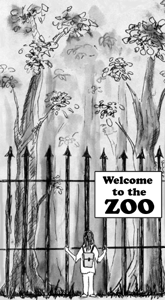
"Oh, I can't do that. They're all fenced in. Remember, it is a zoo."
"So it is. Well then, be sure and ask your mom and dad to take you to the Christmas Museum in Ohio. They have models of Christmas trees there."
Great Granny turns down my bed spread.
"Are those the dead trees people used to put in their living rooms at Christmas time?" I ask.
"Yes. People decorated the dead trees with lights, food, sparkling ornaments - all kinds of things. I heard they were quite beautiful! I can remember an article in the computer saying before the blight took so many of the trees, before the years of darkness, as many as 100,000,000 Christmas trees were cut down in a single year - and that was only in the United States."
Great Granny checks the window to make sure the seal is tight. Everyone worries about leakage now the ozone is gone.
"What kind of trees were they?"
"Evergreens of all kinds."
"What did they do when the trees turned brown? Make furniture and toys?"
"No. People threw their trees away."
"How terrible!"
"Many communities had big bonfires. The dump sites became too full."
"Why didn't the people simply plant a tree outside and decorate that, or decorate house plants or use synthetic trees?"
"Eventually everyone did. They had to. Real trees got to be too expensive. For a while, people shifted from decorating trees to decorating their houses, cars, dog houses, fences - anything that would hold lights - until even that cost too much."
"Wow!"
"My grandmother used to tell me about driving around in one of those old gas cars, going from house to house, just looking at the lights and all the decorations. The evergreens are extinct now."
Great Granny takes a clean nightie out of the drawer.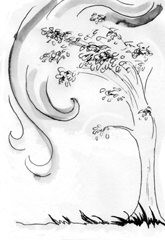
"Like the elephants and lions and tigers and bears?"
"Yes."
"Great Granny?" I ask as I pull my nightie on.
"Yes, dear."
"Why are you looking so sad?"
"I'm feeling sad. Trees gave the world so many good things - shade from the sun and protection from the wind. Did you know trees used to dance when the wind blew? Some people could actually hear the trees sing, but most people never took the time to listen."
"I plan to listen to the oak trees this summer."
"Good for you, my Emily. You'll find they make an unforgettable clickety sound. Here by the Chesapeake Bay, your ancestors used to talk about the trees singing. But then, the giant oaks and the silver maples began to die, followed by the smaller trees, one by one, until only silence remained."
"Too much acid rain again?"
"In part, yes. The acid rain was the beginning of the end for the trees surviving the developer's saw. People could have stopped it by making some changes in their lifestyles, such as replacing all gas cars with electric cars. But at the time, people thought it was too expensive."
"Do you think trees will be extinct forever? Buffalo were almost extinct once, but they managed to come back."
"I don't know. I pray every night your grandchildren won't have to ask what a tree looks like because they will live with them."
"Can I stay up a little while longer?"
"No, dear. It's way past your bedtime as it is. I don't want your mom getting mad at me."
Reluctantly, I get into bed.
Great Granny turns out the light.
"Great Granny, I love you."
"I love you, too, Emily."
Alone in the Dark
"Great Granny?" I ask tentatively. "Great Granny, where are you?"
The room is unusually quiet.
"Great Granny! Where did you go? Hey, it's dark! Say something."
I hate the dark. Particularly when I think of the three years of darkness. Worse, I hate the thought of eating worms.
"Great Granny! Great Granny! Great Granny!"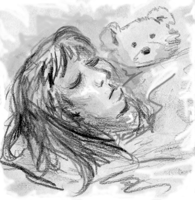
My bedroom door opens. I'm a little confused when I see my mom standing in the doorway.
"Sweetie! Wake up!" she says. "You're having a bad dream!"
I look all around. No Great Granny. No gas mask. The window is open and cool air is blowing in. I can hear the trees. My Legos are still on my work table. I see my City of Trees from my four poster maple bed. I see no plastic furniture.
"Oh, Mom, it was terrible. I dreamed there weren't any trees anywhere!"
"I'm sorry you had a bad dream," she says. "But you made some wonderful trees with some of the paper in the rainy day box."
"Great Granny made them for me."
"I don't think so," says Mom. "Your Great Granny has been dead for a long time. She couldn't have made them."
"She did," I say firmly. "I know she did. She was here."
"Emily, your Great Granny died before you were born."
Now I'm really getting confused. After all, I had spent the whole evening playing and talking with my Great Granny.
"No matter," says my mom. "You go back to sleep now. We can talk about it in the morning."
"Mom, tomorrow I want to plant a tree. I must! Will you help me?"
"Of course," says Mom. "But it's time for you to go to sleep now."
"I'll water the tree every day."
"I'm certain you will," Mom says as she kisses me goodnight.
"'Night, Mom."
"Goodnight, dear." she whispers. I watch her shadow as she walks to the door.
"Mom?" I ask.
"Yes?"
"I'm so glad we have trees."
"So am I!"
My mother closes the door. As my eyes adjust to the dark room, a cool breeze brushes over my face. It feels like a kiss.
| Issue 19 |
Volume VII Number 19
May 13-19, 1999
New Bay Times
| Homepage |
| Back to Archives |